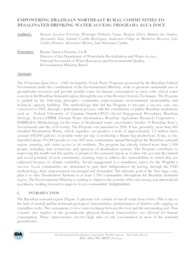Empowering Brazilian Northeast rural communities to desalinated drinking water access: Programa Água Doce.
Empowering Brazilian Northeast rural communities to desalinated drinking water access: Programa Água Doce.
Author(s): FERREIRA, R. S.; VEIGA, H. P.; SANTOS, R. G. B. dos; SAIA, A.; RODRIGUES, S. C.; BEZERRA, A. F. M.; HERMES, L. C.; MOURA, A.; CUNHA, L. H.
Summary: Abstract: The Programa Água Doce-PAD(in English: Fresh Water Program) promoted by the Brazilian Federal Government under the coordinationof the Environmental Ministry, seeks to promote sustainable use of groundwater resources and provide potable water for human consumption in areas withcriticalwater scarcity in the Brazilian Semiarid region, through the use of the Reverse Osmosis Technique. The Program is guided by the following principles: community empowerment, environmental sustainability and technicalcapacity building. The methodology that led the Program to becomea success case was conceived in 2003, through a participatory process with the contribution of public Brazilian institutions such as: Federal University of Campina Grande-UFCG (Social Engagement Procedure); Brazilian Geologic Service-CPRM (Ground Water information), Brazilian Agriculture Research Corporation ?EMBRAPA (Methodology for the reuse of desalinated water concentrate), besides 10 Brazilian State ?s Governments and the civil society. The Program was launched in 2004.Ithas, presently,more than 460 installed Desalination Plants, which, together,can producea total of approximately 1.5 million liters (around 400,000 gallons) of potable water per day (considering a 8h/per dayproduction).It has,so far,benefited about 184,000 people in over 460 rural communities spread throughout the Brazilian semiarid region, ensuring safe water access to its residents. The program has already trained more than 1,000 people, including state technicians and operators of desalination systems. The Program contributes to improving the health and life quality of people in the semiarid regionas it takesinto account the naturaland socialpotential of each communitie, ensuring ways to address the vulnerabilities to which they are subjected becauseof climate variability. Social engagement is a mandatory aspect for the Program?s success. Local communities are stimulated to gain their independence by having, through the PAD methodology, their empowerment encouraged and demanded.The ultimate goal of the first large scaleplan is to take Desalination Systems to at least 1,300 communities throughout the Brazilian Semiaridregion. The Environmental Ministry is seeking to improve the systems with solar energy and automatized machinery,looking forward to improve local communities? independence.
Publication year: 2017
Types of publication: Paper in annals and proceedings
Unit: Embrapa Environment
Observation
Some of Embrapa's publications are published as ePub files. To read them, use or download one of the following free software options to your computer or mobile device. Android: Google Play Books; IOS: iBooks; Windows and Linux: Calibre.
Access other publications
Access the Agricultural Research Database (BDPA) to consult Embrapa's full library collection and records.
Visit Embrapa Bookstore to purchase books and other publications sold by Embrapa.

